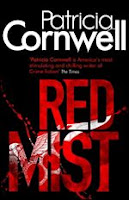An hour ago, Barnes and Noble emailed me (I subscribe) to let me know that Patricia Cornwell's latest book is now available for NOOK, presumably as of today, for $14.99.
Red Mist (Kay
Scarpetta Series #19)
by Patricia Cornwell
$14.99 NOOK Price
This surprised me, because four days ago, December 6th, one of the most unscrupulous pirates I follow (who is allegedly funded and supported by Filesonic.com, by Google, by Yahoo, and by SocialGo, and by corporate advertising) notified me that Red Mist is available free to their VIP subscribers who pay something around $10 for a lifetime of illegal links to ebooks uploaded to Filesonic.com

Red Mist
The new Kay Scarpetta novel from the world's #1 bestselling crime writer.
Determined to find out what happened to her former deputy chief, Jack Fielding, murdered six months earlier, Kay Scarpetta travels to the Georgia Prison for Women, where an inmate has information not only on Fielding, but also on a string of grisly killings. The murder of an Atlanta family years ago, a young woman on death row, and the inexplicable deaths of homeless people as far away as California seem unrelated. But Scarpetta discovers connections that compel her to conclude that what she thought ended with Fielding's death and an attempt on her own life is only the beginning of something far more destructive: a terrifying terrain of conspiracy and potential terrorism on an international scale. And she is the only one who can stop it.
The pirate appears to have lifted the publisher's blurb directly from Amazon. They routinely snag the best bits of Amazon reviews, as far as I can tell.
Maybe Penguin knows why there are two covers for the same e-book.
Now, this sort of piracy carried out by a foreign (probably British) pirate, using a foreign site (Filesonic) is, in my opinion, exactly the sort of freetardy that SOPA ought to slow down. The rival plans simply won't work. If an author finds her new release being published and distributed globally as a "freebie" by pirates four days before the official launch day, she might reasonably wish for her DMCA notice to be respected a day or so after sending it.
Waiting up to eighteen months for a take down is going to ruin careers... not to mention the fact that the Issa/Wyden scheme would impose Government fees on the wronged author, and would require her to stop writing and go to Washington to file documents and employ lawyers.
(I have no right to assume anything on behalf of Ms Cornwell or her publisher. My comments are my own opinions based on two emails sent to me, each offering me access to her latest book.)
Google, EFF, and other tech companies that make a great deal of money from monetizing and promoting websites without regard for whether or not the attractions on those sites are being distributed legally. SOPA would presumably encourage companies to be a bit more socially responsible.
Meanwhile, the Press appears to be assisting the tech companies by writing sensational and misleading pieces as if they are news. In my opinion, one can simplify something to such an extent that it is a misrepresentation.
"Hollywood" suggests that only the powerful movie business has a problem with piracy. Not true. E-Book authors are routinely overlooked and omitted from this debate, yet e-book authors might well be more damaged than most copyright owners by rampant internet piracy which shares hundreds of thousands of illegal copies of e-books via computers, social networking sites, smart phones, and torrents.
Pitting a California Hill against a Californian Valley might tend to distance the issue.
Case in point:
Anti-Piracy Bill Battle: Hollywood vs. Silicon Valley By: Julia Boorstin
Ms Boorstin suggests that the issue at the heart of the debate is "how much companies should be held accountable for policing pirated material to which they might inadvertently link."
In my experience, when she states "inadvertently" Ms Boorstin is bending over backwards to be charitable. Lord Nelson "inadvertently" didn't see the signals that he did not want to see. Red flags are ignored today. However, the fact is that SOPA doesn't ask tech companies to "monitor" or "police" or "detect". It asks them to enforce their own published Terms Of Service (that qualify them for Safe Harbour) when an infraction is brought to their attention.
In my opinion, they ought to enforce their own rules.
By presenting the copyright debate as Hollywood vs Silicon Valley, Ms Boorstin manages to remove all human interest from the "story". The piece trivializes the importance of copyright to copyright owners, and the effect of copyright infringement to those who are tempted to assume that everything on the internet is free regardless of wording such as "all rights reserved".
The proposed OPEN, (the Online Protection and Enforcement of Digital Trade) Act is worse than what we (authors and small independent actors) have now. It sets up a very expensive process for obtaining a remedy without any guarantee of improved results. There is still no compensation for copyright owners. The abuse continues for longer. A successful claim would result in a “cease and desist” order from the ITC, a cynical remedy, given that the rogue sites in question have already demonstrated their utter disregard for U.S. law and international norms.
What are Wyden and Issa thinking? Well, there is a video on YouTube to shed light on that. They also shed
light on their true attitude toward Openness and Censorship on the Internet.
Try leaving a comment:
Remember, these Senators are allegedly concerned about "censorship" on the Internet. They oppose the Stop Online Piracy Act because they want to keep the Internet "Open". How "open" is it to delete all dissenting (but civil) comments on a YouTube video?
----------------------------------------------------------------------------------------------------
----------------------------------------------------------------------------------------------------















